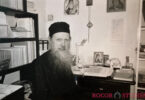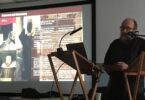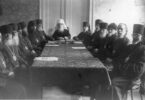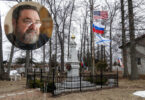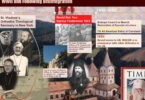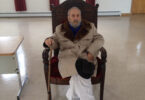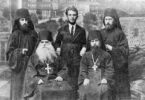Today is the Day of Churaevka, which is in a quiet secluded corner by the Pomerague River, over an hour’s drive from New York. We went there with my new friend, the musician Nicholas Kachanov, in his car, and reached our destination by noon.
George Grebentschikoff’s house is on a hill. It is said that it used to be closer to the river, further down. But at the time that the expressway was being built the house was moved up, and it is now next to the chapel.
We stopped right by the chapel with its shining cupola. It seemed that the golden onion dome shot up arrows right into heaven with its prayers. We went around Grebentschikoff’s former garage, which once housed the printing press of the famous Alatas Publishing House. We dropped in on the Sobolevs, Russian émigrés of the postwar years. The lady of the house was not at home, so we exchanged a few words with her elderly blind husband and went on to find Bishop Daniel.
His house was very close by, just past a bend in the road which went past the chapel. The door was opened by an old, white-bearded man wearing a simple grey canvas version of a priest’s cassock. That was Bishop Daniel himself. We greeted each other, and he said right away,
“I’ve been waiting for you, for a long time, in fact. Sorry for the mess. I always reply to guests, ‘So you wish to see Bishop Daniel? He isn’t home, and I’m his cell attendant.’”
Indeed, the kitchen in which we found ourselves was piled with ancient objects — bells, censers, Russian samovars, and various instruments. Bishop Daniel is a real recluse, and if the ailment of diabetes didn’t torment him, he certainly wouldn’t appear in public. But this being the case he must go frequently to the store for groceries and lead a measured way of life.
The first thing that meets the eye when encountering him is his rare originality in speech and thinking, and in his entire life as a recluse. He is an Old Believer. When serving in the chapel with people present, he conducts the service according to modern usage, but at home he serves the old way. He is familiar with hook (Znamenny) chant, which is almost unknown outside Russia. He sings rare chants, and the Theotokion Chant is particularly beautiful.
The conversation turned to Grebentschikoff right away, and I didn’t conceal my intentions and explained the reason for my coming. A discussion impulsively touching upon various topics ensued, including Grebentschikoff, Bishop Daniel, and music, since Vladyka and Nicholas Kachanov found each other, being experts in early Russian music.
Bishop Daniel recounted that he came to Churaevka when Grebentschikoff was already ill and could not speak, having lost that ability. After the writer and his wife died Vladyka inherited the printing press and the few items that were left in the house. At a certain point he graduated from seminary, where he learned the printing business. When Grebentschikoff was still alive he had started thinking about book publishing, and three years after the writer’s death he published his autobiographical novel Egorka’s Life. Later, it became difficult to work alone, and he simply got tired of it, having become disillusioned by the publishing business.
“Recorded verbiage,” that’s what the printed word is,” he said.
In general, he had many disappointments. He came to Churaevka dreaming of seclusion.
“They said that there’s a small chapel in the forest, and so I came here. I thought I would be serving. But it turned out that no one needs my prayers here. They don’t come to the services.”
“And as for Grebentschikoff,” Bishop Daniel continued, “That was simply an idea. You know, writers often have very many fantasies.”
Does he have in mind a church, a skete… or an Altai Zvenigorod? Bishop Daniel’s characteristic rightfulness started slowly building up. The church isn’t what it should be, and neither are the people.
“Do they need anything? They don’t need anything.”
Of course, Vladyka has his particular opinion regarding Churaevka. An Orthodox attitude still takes the lead. Especially since he came to Churaevka when everything was in a state of decline and Churaevka was a “buried treasure.” And he, too, is a buried treasure. He himself is unaware that, having preserved antiquity in his soul, he represents a rare type of an original Russian man. It is all right that his view of the chapel is from a distance. Sergius conducts the service himself.
“There are books for reading,” Bishop Daniel says, “and books for deference. It’s the same with churches — there are parish churches, monastery ones, and memorial ones.”
Perhaps that is so, but looking at it from the side, from Russia, there is a piece of Russian history, there is the Russian village called Churaevka, lost in American forests. And as long as Churaevka lives, as long as Saint Sergius Chapel is standing, the idea of a wonderful skete lives as well, one in which a lampada will start gleaming and will burn with increasing intensity in the name of the radiant day.
We sat for a long time, frozen from the cold which made its way along our legs. Vladyka suddenly arose out of his stupor, even jumping up.
“We will dine. I’ll prepare an incredibly special dish —falafel in the Churaevka style. I will be a cook now, then a bell ringer, and then a hiero-schemamonk.
Falafel is an Arabic dish of small patties made of chickpea flour. He has perfected this dish by adding fish and eggs to it. Bishop Daniel’s inventiveness is manifested in literally everything. He had gone to Jerusalem for worship and became interested in the Arabic and Persian languages. He is well versed in Persian literature and quoted from the Shah-Nameh for us. He studies everything, he knows how to do everything, he does everything with his own hands, and makes everything himself.
“My trouble,” he says, “is that that I know how to do more than I can.”
Nicholas and I rushed over to help him. We wanted to chop some wood in order to get the furnace going, since it was, after all, cold in the house. But Vladyka protested.
“Obedience tops prayer and fasting,” He took our hatchets and pointed to the table.
“What will you drink,” he asked, “tea or coffee”?
And at this point, without waiting for a response, he started telling us the next of his stories, which he has in great abundance.
“In one Old Believer home I was asked what I would drink, tea or coffee? Tea was condemned at three councils, while coffee at seven. It was clear that I chose tea.”
After dinner we hurried to the St. Sergius Chapel. It was freezing outside, and we were trying to walk as fast as possible. Vladyka fumbled with the lock for a long time and finally opened the door, and we were in the tiny chapel, which had room for ten or twelve people. Little has now been preserved of the inner furnishings from Grebentschikoff’s time. The icons are simple ones. At some point there were ancient ones, but twice thieves got in there and stole the icons. Once Grebentschikoff died there was no more preserver. But it still is a wonderful chapel, for the spirit lives in it. Roerich created it, Grebentschikoff built it, and Bishop Daniel serves in it.
We left the chapel and hurried into the house, where Vladyka was to conduct a service. On the second floor we entered a house church and lit all the lampadas.
“So now I am the bell ringer,” Bishop Daniel reminds us gaily.
We looked around and saw many books in many languages. Great is the Father. Nicholas later recounted meeting some German woman at one point who was amazed at the Bavarian dialect which Bishop Daniel has mastered. In the room’s corners there were stretchers and pieces of board upon which icons had been started.
“Vladyko, do you write icons?” I asked, and he countered right away:
“Before I was a priest, I was an Iconographer. Such a priest, who serves before his ions.”
“Everything is possible in life, but how can you get time for it all?” And again he comes up with a joke.
“Can a camel pass through the eye of a needle? He can. First, his hair has to be cut, and then his fur has to be rolled up and threads need to be woven. The skin can also be dried up and cut up into very thin straps. The meat can be cooked and divided up into separate filaments. And the bones can be thinly sawed up.”
And he asks himself again: “Can a camel pass through the eye of a needle? He can, but a great deal of time will be needed. Too long.”
The service is in progress. Bishop Daniel put on monastic vestments. Singing ancient chants, he swings the censer and prays. Here she is, this Radonega!
“Vladyko,” I said, “Let’s go to the Altai, to Russia. We will build a real Churaevka there and conduct services there.”
Surprised, he hesitated and even braced himself, but said nothing. I sensed that he would have wanted to go. After some thought he said,
“How much more time do I have? I won’t live to be one hundred. Well, I’ll still serve ten or twenty years.”
“And is that not enough?” I insisted.
He remained silent. Only he knows what he was thinking of.

